Written by Alison Johnson
—
[dropcap]Of every four deaths each year in the United States, one is caused by heart disease.[/dropcap]
That statistic from the Centers for Disease Control and Prevention is just one of many that reflect how many people struggle with heart disorders. Heart disease is the leading cause of death for both men and women and affects people of all backgrounds and ages, from infants born with structural defects to seniors with progressive heart failure.
On the plus side, doctors have more tools for diagnosis and treatment than ever, and everyone can help protect themselves with a healthy lifestyle and better awareness of signs of trouble.
Here, four people share their stories of struggle and survival.
JOY SPENCER, 36 NEWPORT NEWS, VA
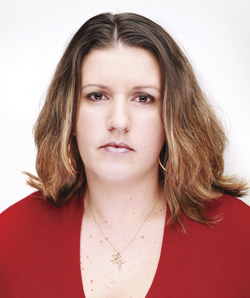 The first time Joy Spencer’s heart began beating irregularly—the time she likely came within hours of having a stroke—she assumed it was nothing. One of those moments everyone has, she thought, when the heart suddenly pounds madly and maybe skips a beat but then quickly settles back to normal. She was 33 years old, exercised regularly, ate well, didn’t smoke and had no family history of heart disease.
The first time Joy Spencer’s heart began beating irregularly—the time she likely came within hours of having a stroke—she assumed it was nothing. One of those moments everyone has, she thought, when the heart suddenly pounds madly and maybe skips a beat but then quickly settles back to normal. She was 33 years old, exercised regularly, ate well, didn’t smoke and had no family history of heart disease.
But a half-hour later on that morning, Aug. 16, 2010, she realized she was in trouble. Rest and deep breathing weren’t helping. Her husband, Todd, was at work in Portsmouth and she was home alone with two young children. Wanting her son and daughter to be safe, Spencer dropped them off at child care before driving herself to an urgent care center. There, shocked doctors diagnosed her with atrial fibrillation, or an abnormal rhythm in the upper chambers of the heart that interferes with how much blood gets to the body.
In the emergency room at Riverside Regional Medical Center, doctors gave Spencer medicine to try to slow her heart rate. If they couldn’t get it under control in 24 hours, she’d be at risk for a life-threatening stroke. The medicine took 21 hours to work.
Since then, Spencer, now 36, has had two more episodes of atrial fibrillation that landed her in the hospital, although neither as serious. She takes daily medication to keep her heart rhythm regular, which she’ll likely need for the rest of her life. If her heart begins beating too quickly—she has a monitor to check if she begins feeling shaky or anxious—she takes a second pill. If that doesn’t bring the rate down to a safe level, she has instructions to go to the emergency room.
“At first it was scary, but now it has become a normal part of my life,” Spencer says. “I know exactly what’s happening. It doesn’t hurt—I just have to watch it and take my medication. Some days are a little harder than others, but it’s never an all-day type of thing. I just tell myself to be calm, to breathe.”
Otherwise healthy, Spencer stays busy with children Chase, 7, and Summer, 4, and her job as an e-business solution manager at Ferguson, a wholesale distributor in Newport News. She also walks or runs almost daily and recently completed a half-marathon. While she doesn’t always let on if she’s feeling a bit off—she doesn’t like to worry Todd, whose brother died of a heart attack—she’d never brush off troubling
symptoms again.
“No one should think they’re immune to heart problems,” she says. “When in doubt, get help. Go to the emergency room. Trust your instincts.”
[quote]“No one should think they’re immune to heart problems,” she says. “When in doubt, get help. Go to the emergency room. Trust your instincts.”[/quote]
JOHN LAYDEN, 50 MOYOCK, NC
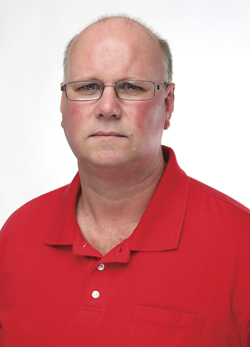 People with the kind of blockage that John Layden had—a severe narrowing of his left anterior descending coronary artery, which supplies a large part of the heart—don’t usually get warnings. They get massive heart attacks. In fact, many doctors refer to such blockages as “widow makers.”
People with the kind of blockage that John Layden had—a severe narrowing of his left anterior descending coronary artery, which supplies a large part of the heart—don’t usually get warnings. They get massive heart attacks. In fact, many doctors refer to such blockages as “widow makers.”
Layden actually got three warnings, in the form of sharp chest pains during exertion last spring. Even then, he did what too many heart patients do: he tried to ignore them, in his case for more than a month. Once, after the pain spread from his chest to his shoulders and down both arms, a doctor friend told him to go straight to the emergency room and say he might be having a heart attack. He didn’t.
“I was scared,” admits Layden, now 50. “My dad had bypass surgery when he was about 60, and I saw him after with all these tubes coming out of his mouth. I didn’t want to go through the same thing. I didn’t even tell my wife what was happening with me.”
When Layden finally did go to the hospital for tests, doctors found an almost complete blockage in one artery and some narrowing in two others. He had bypass surgery on May 10 at Bon Secours Maryview Medical Center in Portsmouth, where doctors connected a healthy artery inside his chest cavity to his heart to supply blood. After a three-night hospital stay and five weeks of recovery time, he was back at work, his heart undamaged.
“I was so lucky,” Layden says. “My message to anybody is if you think you’re having heart problems, go get it checked out—because you probably are. Get the surgery. Get it done. Don’t waste time being afraid of it.”
A long-time aircraft mechanic, Layden commutes from his home in Moyock, N.C., to his job as a quality assurance specialist for the Navy’s Fleet Readiness Center Mid-Atlantic in Norfolk. But he has carved out time for regular exercise, usually walks or workouts on a home elliptical machine, and has dropped more than 40 pounds by lowering his portion sizes and cutting out most greasy, fatty foods. He had been about 100 pounds too heavy before his surgery, he says, but didn’t listen to his doctor’s urgings to lose weight despite a strong history of heart problems on his father’s side of the family.
Grateful for his health, Layden and his wife of 22 years, Denise, have something huge to look forward to this year: welcoming their first grandchild, a little girl due this month. “I really shouldn’t be here,” he says. “Denise should be a widow. I just hope other people make different decisions than I did, because not everyone will get the ending I did.”
[quote]“I really shouldn’t be here … not everyone will get the ending I did.”[/quote]
AVA STROHECKER, 7 CHESAPEAKE, VA
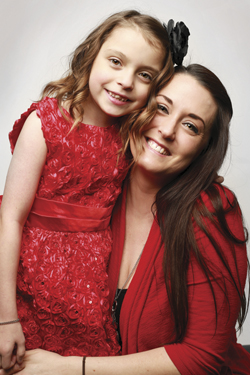 Ask little Ava Strohecker to describe her heart and she’ll simply say, “It’s special.” Amazingly special, in fact: Ava, now 7, was born with her heart on the opposite side of her chest, with two rather than four chambers and flipped backward, so the part that normally faces the front of the body is in back.
Ask little Ava Strohecker to describe her heart and she’ll simply say, “It’s special.” Amazingly special, in fact: Ava, now 7, was born with her heart on the opposite side of her chest, with two rather than four chambers and flipped backward, so the part that normally faces the front of the body is in back.
The Chesapeake girl has survived three open-heart surgeries, including one when she was just two weeks old and her heart stopped beating several times on the operating table. Doctors discovered Ava’s congenital defect during a routine ultrasound when her mother, Kelly Strohecker, was about five months pregnant. “She came out pink and then turned blue shortly afterward,” Strohecker says of her third child. “I didn’t get to hold her until she was a week old. It was very emotional and scary, very intense. We have learned not to take any day for granted.”
Ava has Heterotaxy syndrome, a rare disorder that results in certain organs forming on the opposite side of the body. She also was born with intestinal abnormalities and without a spleen, an organ that helps fight infection but isn’t essential for survival. She spent her first three months at Children’s Hospital of The King’s Daughters, at times hooked to a ventilator.
After her last open-heart surgery, at age 4, Ava has had several minor heart procedures but is doing well overall, her mother says. The second-grader is small for her age, has some attention problems and can’t play contact sports, but she loves to dance, sing, run, go to Girl Scout meetings, watch Animal Planet and play with her Labrador retriever mix, Zeus. “She’s quite hyper,” Strohecker says. “You could never tell there was anything wrong with her unless she lifted her shirt and you could see all the scars.”
Strohecker, whose two older daughters developed normally, considers her family very lucky because Ava’s heart problems were caught before birth. The future is a little uncertain: Many people with Ava’s condition eventually need a pacemaker to regulate their heartbeat, as well as a heart transplant around age 20. For now, though, Ava has no surgeries planned.
Her family is passionate about raising awareness that heart problems aren’t confined to adults. Out of every 1,000 babies born, for example, nine will have some kind of heart disorder, although most are minor, according to the American Heart Association; doctors usually don’t know the cause. “They affect the young far more than people know,” Strohecker says. “When I talk to someone who is pregnant, I say, ‘Make sure they look at the heart’—because that can make the difference
for survival.”
SHARON CHACHERE, 53 CHESAPEAKE, VA
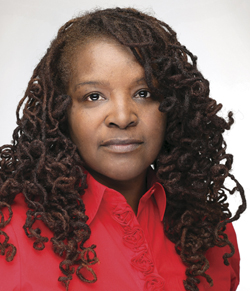 Every time Sharon Chachere typed the phrase “burning pain in lungs” into her computer’s search engine, the results were all about various lung problems. Chachere had recently recovered from pneumonia when the pain struck three years ago, and she also has asthma. She figured her chest discomfort, which felt like sucking in frigid air, was part of a long healing process for her lungs.
Every time Sharon Chachere typed the phrase “burning pain in lungs” into her computer’s search engine, the results were all about various lung problems. Chachere had recently recovered from pneumonia when the pain struck three years ago, and she also has asthma. She figured her chest discomfort, which felt like sucking in frigid air, was part of a long healing process for her lungs.
But after about four months of researching her worsening symptom, a different type of article suddenly popped up. This one was about heart disease. Stunned, Chachere found herself reading about a woman who had her exact symptoms – and they were signals of a
heart attack.
“I still didn’t believe it could be my heart,” says Chachere, now 53. “There was no pressure, no nausea or sharp pains, none of the things you always hear about. I was young and healthy and fit. I never thought it would be me.”
When the Chesapeake resident went to the hospital after reading that article, however, doctors found significant blockages in several arteries leading to her heart; she’d need triple bypass surgery. One doctor told her that without treatment, she likely would have had a major heart attack within three months. The only reason she hadn’t already had one, he added, was her healthy lifestyle.
Chachere now is passionate about educating others, particularly younger women and their doctors, to consider heart disease as a possible source of unexplained pain or breathing problems – even if they don’t fit stereotypical patient profiles. As she notes, she wasn’t overweight, didn’t smoke, avoided red meat, practiced yoga for stress management and had even passed a stress test designed to check her heart health. However, her father had died of a heart attack at age 41, and she was on medication to control her blood pressure.
“Take that family history very seriously,” she says, adding, “If you think it might be your heart, push for more tests. It’s always better to be safe than sorry.”
While Chachere takes a blood thinner to prevent clots, sees a cardiologist every six months and could face more heart procedures down the road, she’s currently healthy. She hopes to become a yoga instructor and enjoys spending time with her 8-year-old granddaughter. “I’m just glad to be here, living life,” she says. “If I can save other women from going through everything I did, I would be
so happy.”
FREDDY JONES, 68 CHESTERFIELD, VA
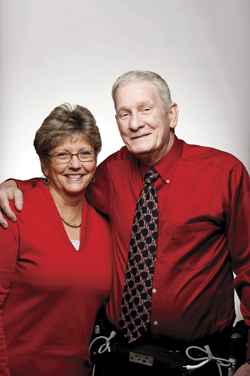 Freddy Jones spent half a year feeling like he was slowly dying, a little more each day. His heart failing, he couldn’t sleep well and eventually grew so weak that even rolling the garbage can out to the street left him gasping for air. He lost 20 pounds of muscle mass, dropping down to skin and bones.
Freddy Jones spent half a year feeling like he was slowly dying, a little more each day. His heart failing, he couldn’t sleep well and eventually grew so weak that even rolling the garbage can out to the street left him gasping for air. He lost 20 pounds of muscle mass, dropping down to skin and bones.
Jones, 68, had survived a heart attack at age 42 and a triple bypass surgery in 1999, and he’d had a pacemaker to regulate his heart rhythm since 2005. This time, his heart wasn’t going to last.
“It was pretty terrible,” he says. “Eventually, about the only thing I could do comfortably was sit. I was getting worse and worse and just wondering, ‘How much time have I got on this earth?’ I wasn’t ready to die.”
Thanks to an advanced piece of technology called a left-ventricular assist device, or LVAD, the Chesterfield man has gained time—and hope—as he waits for a heart transplant. LVADs, used in patients with severely weakened or failing hearts, connect to the organ’s main pumping chamber and help it deliver oxygen-rich blood throughout the body. The mechanical device is implanted but connected to a controller and external battery pack that patients recharge at night.
Jones had his surgery last June at St. Mary’s Hospital in Richmond, where his surgeon, from the Bon Secours Heart & Vascular Institute, has implanted more than 30 devices since 2010. He needed two weeks in the hospital but immediately began sleeping better. Since then, Jones has regained weight and grown strong enough to enjoy favorite activities such as yard work and shopping with his wife, Vickie, who changes the bandage on the line that leaves his body and connects to the controller every other day. “Before, I didn’t feel like going anywhere because breathing was so hard,” he says. “Now I can do pretty much whatever I want.”
The type of LVAD that Jones has, lighter and quieter than earlier models, is designed to last up to 10 years. The grandfather of 11 is on the waiting list for a new heart at Inova Fairfax Hospital; doctors hope that will happen in less than two years thanks to his rare blood type, AB positive, which allows him receive an organ from a donor of any blood type.
Looking back, Jones says his 1987 heart attack, which he initially chalked up to bad indigestion, shouldn’t have caught him by surprise. Although he’d had no major health problems and spent 21 years in the Army National Guard, he had a family history of heart disease and was a smoker. “I shouldn’t have waited so long to get to the emergency room,” he says. “By the time I did, the damage was done.”
GAIL ALEXANDER-WRIGHT, 37 CHESAPEAKE, VA
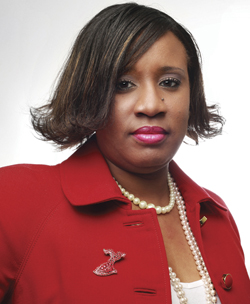 Up until the moment an emergency room doctor told Gail Alexander-Wright that she was having a heart attack, she didn’t think she was having a heart attack.
Up until the moment an emergency room doctor told Gail Alexander-Wright that she was having a heart attack, she didn’t think she was having a heart attack.
At 37, Alexander-Wright was otherwise healthy. Just four days earlier, in fact, the Navy reservist had passed a military fitness test by running 1½ miles in under 12 minutes and knocking out 120 sit-ups and 100 push-ups. She wasn’t overweight and didn’t have high blood pressure or cholesterol. Her initial symptoms—pressure in her chest, along with some nausea and a persistent neck ache—also didn’t match the piercing chest pains many people assume are part of all heart attacks.
Alexander-Wright thought maybe she had a stomach bug, or that she’d overdone a workout earlier that day—Nov. 7, 2007—so she lay down for an evening nap. Her husband had just deployed overseas two days before with the Navy, and she asked her daughter Brittany, then 14, to wake her in an hour.
“I didn’t have the shortness of breath, or that feeling described like an elephant sitting on your chest, until much later, after I was at the hospital,” Alexander-Wright says. “It was Brittany who called the ambulance. She just said I looked like death. I probably would have died if she hadn’t made that call.”
The diagnosis shocked everyone, including Alexander-Wright’s husband, Andre, who flew home to care for her, and even hospital doctors, who initially suspected she had damaged her heart by using illegal drugs. What no one knew was that she did have a huge risk factor for heart disease: a strong family history on her father’s side. Her father had his first of several heart attacks when he was just 28 years old, but since her parents had divorced, Alexander-Wright had never been aware of that.
“Now I try to get people to really look into their family history,” she says. “I probably should have been seeing a cardiologist for regular checkups from a very young age.”
The heart attack was caused by a blood clot linked to coronary artery disease, or fatty deposits inside blood vessels that supply the heart. While Alexander-Wright also suffered a stroke in 2008, she now controls the disease with several medications along with a healthy diet, exercise and rest if she feels fatigued or stressed. “I’ve had to slow myself down,” she says. “I’m doing well, but I’d put myself at about 80 percent of the person I used to be when it comes to physical strength.”
Now 42 and a business analyst for an insurance company, Alexander-Wright is passionate about raising awareness that heart disease can strike anyone, even young, outwardly healthy women. “If you’re not feeling right, don’t let a doctor brush off your symptoms as anxiety or just ‘something in your head,’” she says. “If one doctor doesn’t listen, find another one who does.”
[quote]I probably would have died if she hadn’t made that call.[/quote]






